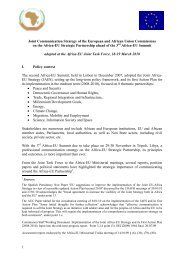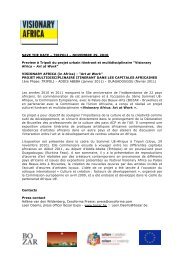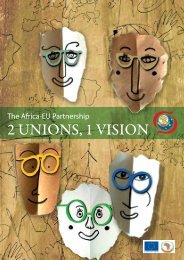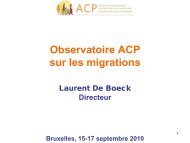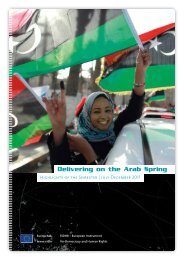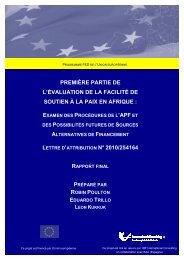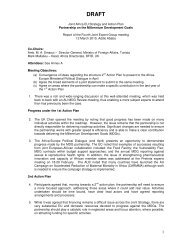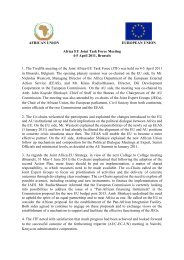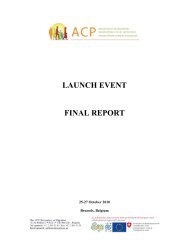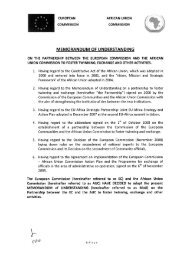part 1 of the african peace facility evaluation - European ...
part 1 of the african peace facility evaluation - European ...
part 1 of the african peace facility evaluation - European ...
Create successful ePaper yourself
Turn your PDF publications into a flip-book with our unique Google optimized e-Paper software.
The need to respond quickly to <strong>peace</strong> and security challenges has forced APF <strong>of</strong>ficials in DEVCO to<br />
find solutions to make up for lengthy decision-making procedures: retroactivity and <strong>the</strong> reallocation <strong>of</strong><br />
funds from previous APF actions have been introduced with this objective, in line with <strong>the</strong> legal rules<br />
(article 19) <strong>of</strong> <strong>the</strong> Cotonou Agreement.<br />
PRACTICE<br />
In principle, APF regulations have a relatively flexible approach, as <strong>the</strong>y do not impose <strong>the</strong> use <strong>of</strong><br />
specific implementation modalities. The EC has to decide which aid modality is more suitable for APF<br />
action, taking into account <strong>the</strong> situation within AU/RECS. In a sense, <strong>the</strong> most realistic process would<br />
have been for all APF funding to be transferred to AU/RECs through Grant Agreements, until <strong>the</strong>se<br />
institutions were ready from an operational/financial/management perspective. However, it seems that<br />
<strong>the</strong> political willingness to promote African ownership led <strong>the</strong> Commission not to insist on <strong>the</strong> need for<br />
<strong>the</strong>se organisations to prove that <strong>the</strong>y could meet minimum conditions regarding sound administration<br />
for implementing Contribution Agreements. This dynamic interpretation and <strong>the</strong> corresponding<br />
integrated approach to capacity development are <strong>part</strong> <strong>of</strong> <strong>the</strong> Commission’s overall approach to<br />
development, including <strong>the</strong> use <strong>of</strong> EU budget support in developing countries. This approach is<br />
commended by <strong>the</strong> <strong>evaluation</strong>, as it would o<strong>the</strong>rwise be difficult for African countries and organisations<br />
to ever build a sustainable capacity to deal with <strong>peace</strong> and security. That said, it is very important that<br />
<strong>the</strong> Commission fully understands and appreciates <strong>the</strong> risks involved and that appropriate risk<br />
management strategies are used including risk aversion measures such as targeted capacity building,<br />
oversight and political dialogue.<br />
Audits soon started to prove problematic, and DEVCO was laudably creative in finding solutions to<br />
keep <strong>the</strong> APF on track, without damaging expectations already created among AU and RECs<br />
concerning <strong>the</strong>ir ownerships. Progress has been made by <strong>the</strong> AUC in improving its internal controls<br />
and procedures; <strong>the</strong> 4-pillar standard may well be accorded in 2011. The same may not be true for<br />
every REC except COMESA. Without <strong>the</strong> active intervention <strong>of</strong> EU delegations, it seems very difficult<br />
for APF in Brussels to effectively support <strong>the</strong> RECs. So at least <strong>the</strong> monitoring <strong>of</strong> specific REC<br />
components (not PSOs) could be better managed by EU Delegations who have <strong>the</strong> necessary<br />
expertise.<br />
APF regulations demand that ‘joint lessons learned exercises on APF implementation be held<br />
systematically’ 42 , so that outcomes can be discussed in relevant fora, in <strong>part</strong>icular at <strong>the</strong> APF Joint<br />
Coordination Committee; and recommendations followed. However, since 2007 in Djibouti, such an<br />
exercise has never taken place. According to DEVCO C5 in Brussels, this issue has been extensively<br />
discussed in every capacity-building APF steering committee meeting. This is regrettable: <strong>the</strong>se formal<br />
exercises provide a good opportunity to discuss <strong>the</strong> problems related to APF implementation more<br />
deeply and in a more detailed manner. Instead, DEVCO has to deal with problems on a case-by-case<br />
basis.<br />
BUDGETS AND THEIR AMENDMENT<br />
Requests by AU/RECs to transfer a certain amount between budget headings may be acceptable,<br />
provided <strong>the</strong>y do not request new activities. DEVCO analyses whe<strong>the</strong>r <strong>the</strong>se requests are coherent,<br />
feasible and acceptable. If accepted, an addendum to <strong>the</strong> contract (grant or contribution agreement)<br />
is established and signed by both <strong>part</strong>ies. As long as <strong>the</strong> modifications requested by <strong>the</strong> AU/RECs are<br />
non substantial, <strong>the</strong>re is no intervention from <strong>the</strong> political side - <strong>the</strong> Council (AWG/PSC) - as <strong>the</strong><br />
change in <strong>the</strong> contract does not affect <strong>the</strong> supporting EC decision: it is just an operational issue and<br />
shows good flexibility in EDF/APF. These “riders” were used for AMISOM on several occasions to<br />
42 Three-year Action Programme for APF 2008-2010 (10th EDF), point 6.5 on lessons learned.<br />
Page 25 <strong>of</strong> 49




